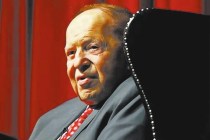Bills for and against Internet gaming continue to surface in statehouses and Congress, which means more billable hours for the lobbying sector. But so far, the return on investment for casino operators hasn’t been the billion-dollar windfall some predicted.
- Home
- >> Business
- >> Business Columns
Inside Gaming
Richard N. Velotta’s Inside Gaming column appears Sunday and Wednesday in Business.
rvelotta@reviewjournal.com … @RickVelotta on Twitter. 702-477-3893
The ink was hardly dry on lottery giant Scientific Games Corp.’s $1.5 billion buyout of slot machine manufacturer WMS Industries when the corporate management team was shaken up with a new CEO and chairman in November. An even larger transition could come later this year.
Harsh winter weatheres kept casino patrons at home in several states where companies such as Penn National Gaming, Isle of Capri Casinos, Pinnacle Entertainment and Boyd Gaming Corp. derive the bulk of their quarterly revenue.
Word is that the U.S. Treasury Department may soon require the casino industry to report the source of gambling funds used by their big spending high-rollers. The move is part of a stepped-up federal effort to crack down on money laundering.
The Salt River-Pima Indian Community has a real estate footprint in this city, 20 minutes east of downtown Phoenix, that makes the 67-acre CityCenter look like a strip mall.
You have to hand it to online gaming giant PokerStars.
There is a target on the back of slot machine manufacturer International Game Technology. Despite first-quarter results that were well received by investors, at least two analysts raised concerns in recent weeks that IGT could be bleeding away slot machine market share to the competition.
Million-dollar fines for violating Nevada gaming law used to be rare.
A New York-based hedge fund acquired a 5 percent ownership stake in Boyd Gaming Corp. last week and immediately fueled rampant speculation in the investment community.
Nothing is simple when it comes to Caesars Entertainment Corp. Take last week’s announcement that the company is selling four casinos to its Caesars Growth Partners subsidiary for $2.2 billion.
MGM Resorts International is showing investors what a 51 percent ownership stake in its publicly traded Chinese subsidiary means financially to the casino operator’s business back home.
Florida is back in play, but no one really seems to care.
Lost in the heated rhetoric over the expansion of Internet gaming is a harsh reality.
If there’s one thing we learned from last week’s telephone press conference by the Coalition to Stop Internet Gambling it’s that all five speakers “were honored” to be on the 45-minute call.
Clearly, Caesars Entertainment Corp. doesn’t want visitors to The Cromwell to gamble, drink, smoke, fornicate or perform any other sinful act at the newly renamed boutique Strip hotel-casino.

















